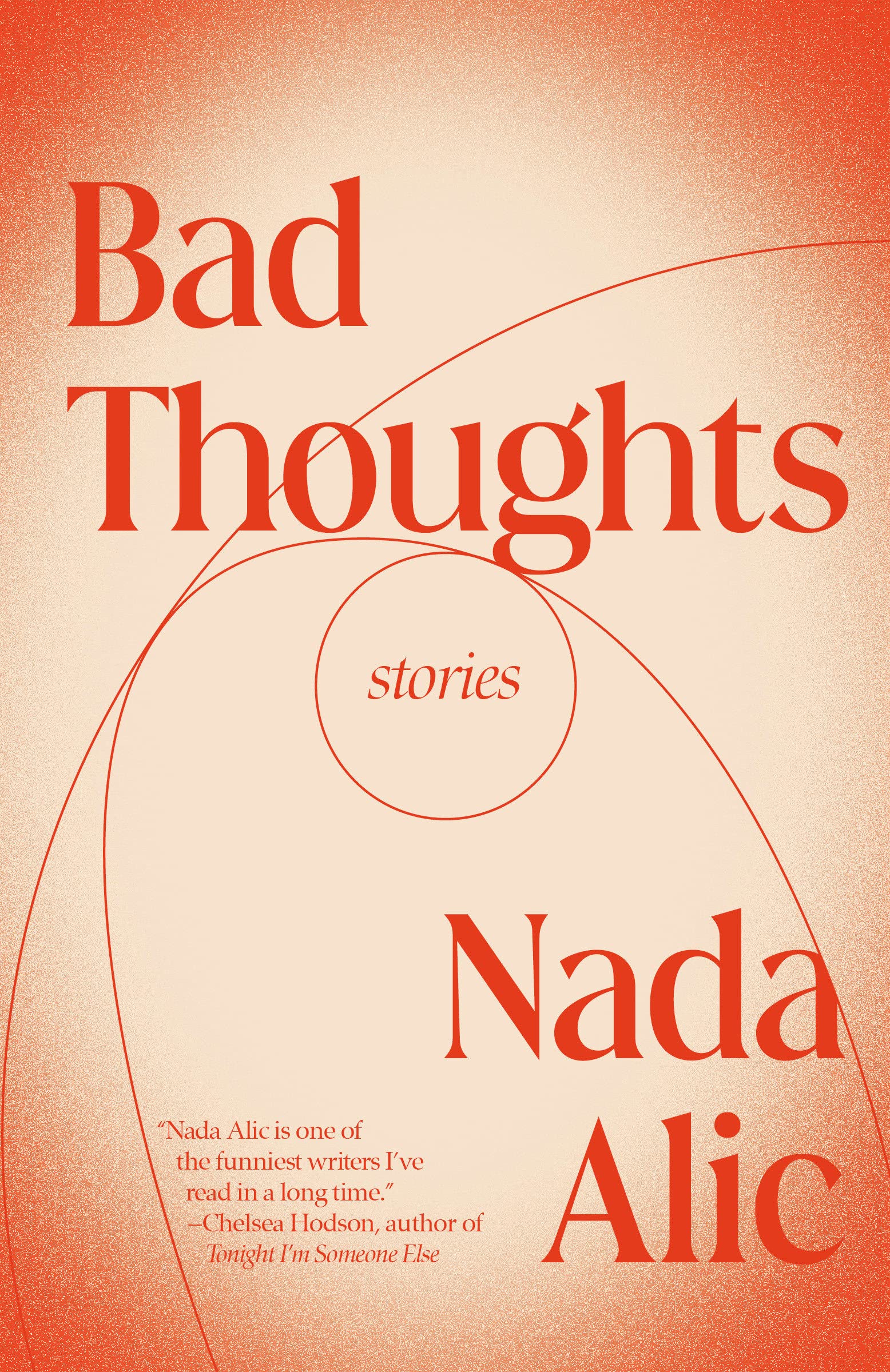We Only Do What We Must
Reviews
By Shy Watson
Nada Alic’s debut story collection, Bad Thoughts, reads like a deranged and hilarious millennial case study. Like many of us, her characters seek spiritual fulfilment, genuine romantic connection, an acceptance of death, and, above all, to be truly seen. But their attempts to satisfy these longings inevitably fail, if to varying degrees, suggesting that such goals might not even be attainable. Yet here the characters are, against all odds, trying.
Each story leverages a first-person point of view to create an unsettling level of intimacy. Take these lines from “Daddy’s Girl”: “I accidentally locked eyes with an elderly man hosing down a flower bed in his yard and let out a tiny silent fart, which sometimes happens when I’m nervous or afraid.” As readers, we are never spared. As in Ottessa Moshfegh’s work, the power of subjectivity coalesces with the corporeal repugnance of being human. But, in Alic’s stories, these moments take on a deeper significance, with characters constantly confronted by their eventual mortality. As in life, death lurks around every corner of Bad Thoughts. In “Tug, Spin, Release,” a narrator distrusts the myriad ailments her alcoholic roommate claims to have. In “My God, Your Face,” a somatic therapist is visited for what begins as a neck rash and forces her client to huff her pungent sock. In “A Free Woman,” a perpetually histaminic woman coerces her less attractive but allergy-free sister into eating everything she can’t. In “The Party,” a narrator tests ecstasy in honor of her friends only to become uncomfortably high as she phones her doctor from the privacy of the party host’s bathroom. Each character responds to each existential threat differently, some with transcended egoless acceptance, others with spazzed-out hypochondria.
Almost every story also includes some reference to mysticism: from demons to universal attunement to cord-cutting and telekinesis. Alic’s characters are often so staunch in their beliefs that they become absurd. A cult leader in “Earth to Lydia” observes the degradation of human spirit while watching shoppers shop for paint at Lowe’s. A P.E. teacher and aspiring poet unsubscribes to streaming services and cancels her gym membership in anticipation of acceptance to a prestigious writing residency in “Tug, Spin, Release.” And, in “A Free Woman,” a woman claims to be able to project her astral body into her sister’s bedroom (because how else could she know that her sheets are white?). Even when these delusions don’t destroy Alic’s characters, they contribute to a sense of isolation in the presence of others.
Alic also likes to meet her characters’ desire to be understood with laughable obstacles. In “Watch Me,” a musician’s girlfriend performs in front of his security camera while he is on tour. He probably isn’t watching—he’s very busy—but the panopticon-ish scenario serves as a therapeutic outlet while she orates her life story to the silent lens. In “This is Heaven,” a married couple gazes into each other’s eyes long after their faces distort in an attempt to see their partner’s essential self. This hyperfocus results in the husband’s temporary transformation into someone as “menacing as a serial killer or a lonely youth pastor.” In “The Party,” a broke writer goes out in celebration of a friend’s birthday and feels entirely underdressed as two designer-clad acquaintances obnoxiously perform the fraudulent roles of friends. The feelings of estrangement in Bad Thoughts also extend beyond interpersonal relationships. Characters surprise themselves by finding strange clothing their past selves have purchased; they watch in horror as their veins begin to resemble something more like noodles.
Although the absurdity of Bad Thoughts may be reminiscent of Miranda July’s zany No One Belongs Here More Than You, these stories have more heart. Far from dogging on her narrators, Alic takes care to humanize them. As readers, we understand the various desperations that drive her characters to take such extreme actions. In “A Free Woman,” we learn that the narrator’s relationship with her sister is fraught due to her own guilt of apparently consuming a twin in utero. In “Daddy’s Girl,” we begin to comprehend a father-daughter relationship by way of past disappointments—when the narrator panicked at a funeral at age five because she understood the imminence of death, and when the same narrator cried at a swimming pool three years later after seeing her dad’s bulge, insistent that a creature had crawled into his trunks and was attacking him from the inside out. We gain an even more nuanced understanding when the narrator compares her father favorably to her friend’s father, and, eventually, to her very own boyfriend.
It isn’t easy to make this reader laugh, yet while reading Bad Thoughts, I found myself in the throes. Alic’s keen eye for detail and almost exalted portrayal of human suffering had me shook. I finished these stories with the impression that Nada Alic sees and understands all; that she, like many of her characters, may have a direct line to God. While endlessly entertaining, the book also taught me something: that, as people, we only do what we must.
Shy Watson wrote Horror Vacui (House of Vlad). More of her work can be found in Joyland, New York Tyrant, Hobart, and elsewhere. She is an MFA candidate at the University of Montana and an instructor at Catapult.
More Reviews



